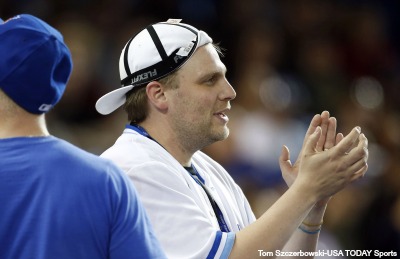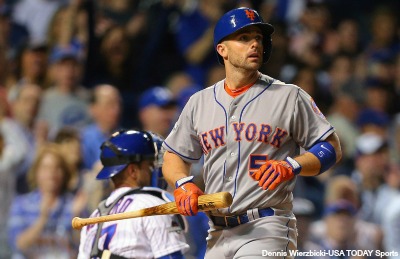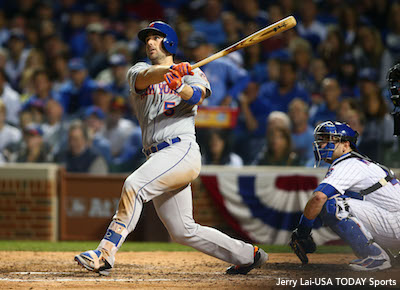The last time the Mets were in the playoffs, in 2006, they lost to the St. Louis Cardinals in the ninth inning of Game 7 of the NLCS. It happened in the heartbreaking way reserved for baseball teams whose fanbases feature the devoutness of Job and endure punishments to match.
And for the past nine years, I have blamed myself for that loss. It's been all my fault.
It's because I fell asleep.
Many -- maybe most -- sports fans are superstitious. But baseball fans take it one step further.
Perhaps it's because so many of us have experience with the game from our childhoods, and have learned all the metaphysical ways a game might tip -- that things were only under our control so much as the gods allowed. There was always something beyond our own visions and performance.
We baseball fans have strict rules: Never speak of a no-hitter or perfect game in progress. Wear your hat, turned inside out (the necessity of backwards or not is currently disputed) as a "Rally Cap" to spark life in dead bats.
Use the same bat until it runs out of hits. Wear the same socks. Never step on the foul line. These tendencies stay with us long after we stop playing, becoming mere spectators.

Even casual fans know that baseball is under the sway of mystical and fickle forces. My mother claims the Mets lose when she watches them on TV. Luckily, it isn't often.
My girlfriend's grandmother thought the same thing about the Red Sox. She refused to watch the curse-breaking World Series and died just before Boston won again in 2013.
There's something peculiar about the impact of eyes on screens dozens, hundreds of miles from the diamond. We can't make sense of it, but we know it's there.
I know. I cost the Mets a series by not watching. Well, I watched every game. But for four games I fell asleep before the last out.
And they lost them all.
October 2006: I had just turned 17. I was a senior in high school, not yet in the home stretch of pre-graduation apathy. I was taking four Advanced Placement classes. Among them: Calculus with Mr. Mika, who was lean and spoke in bursts. He had a wide smile, a boyish haircut, and perhaps the brightest, most friendly attitude of any teacher in the school.
And he, like me, was a Mets fan.
I found it much easier to think and talk about baseball than calculus. I struggled from the outset and never recovered. In the classroom, I felt the same as when I watched Al Leiter start. But Mr. Mika did his best to help me as I tried to break out of a string of C grades.
Maybe those Cs were, at least in part, because of my sleeping habits. Not that I was great at math, but perhaps if we didn't start at 7:20 in the morning, having to leave at 6:30 to make it to school in D.C metro-area traffic, perhaps I might have been more awake and a better student. And perhaps the 2006 Mets would have written a different ending.
We had cable channels on just one television in our house. I took over our living room for Mets' playoff games, watching from a paisley rocking chair. My homework across my lap, my book bag in a crumpled pile by my feet, both ignored. How could I hope to pay attention to anything when Beltran was at the plate, or David Wright, already becoming a hero to Mets fans?

I wish I could, and at the same time am glad that I can't, remember more of that series. I was lucky: I'd go off to college in North Carolina the next year, distracted with my studies (miraculously improved) and those best years of life, and miss the regular-season collapses. I would register the sub-.500 seasons with a shrug and say, "I mean, it is the Mets, after all."
I wore my fandom on my sleeve, but sometimes with a jacket over top. Especially since the Carolinas are a liminal space between teams. Mostly, it was Braves fans. The Nationals were new, still feeling too far away to be the home team. But there were those others: Post-curse Red Sox fans and, worst of the worst, Yankees fans. So I went to games over breaks in the summer, whenever the Mets came to town.
Friends and family asked why I wasn't a Nationals fan, didn't switch allegiances. After all, I'd been born a New Yorker, but only lived there for 18 months. I'd been a Virginian for 18 years.
"Maybe if they weren't the same division, it'd be different," I'd say. But really, I just judged them. What would I do with my tchotchkes, my jerseys, my posters? Change my team, fly different colors? Who would do that? Who would be so faithless?
But here's what I do remember, at least of that final, fateful 2006 game: I remember Scott Rolen's hit, high and deep, back-back-back to the wall and so far gone, so certainly spirit-crushing. And then Endy Chavez, his arm extending up and over the fence, bending back as the glove is struck with a sudden weight, the ball sticking out the end of the glove like a moon dragged down from the sky. The ball is swallowed up into the leather as he lands and throws the ball back to the infield, where it beats Jim Edmonds to first to cap a double play and end the top of the sixth.
I stood, I clapped. I pumped my fist. Before the next inning, I fell asleep.
My mom woke me up sometime after midnight. I trudged off to bed without checking the scores. I wouldn't see until I readied for school the next morning and caught SportsCenter.
Mr. Mika spoke a bit slower that day as we went over derivatives. Or maybe I processed everything in a disheartened fog. But it was over. It was worse than it had been in 2000, it was worse than all those losing seasons. And I blamed myself. I already suspected that my decision to watch or not watch could have some sort of effect on the game. I thought maybe the only person who felt worse than me would be Carlos Beltran.
Because, are you kidding me? Struck out looking?
Slowly, that team was dismantled.
The only player remaining from that 2006 Mets team is The Captain, David Wright. Everyone else is gone, to other teams, other opportunities. Xavier Nady got a ring, José Reyes somehow ended up on the Marlins, Beltran now plays in pinstripes.
For my most recent birthday, I went to the Mets-Nationals game on September 9. It was a game where the sixth inning took so long the seasons changed. The Nationals walked six batters with two outs amid utter collapse. I clapped until my hands were sore. I stood, whooped and hollered and watched the sinking faces of Washington fans. I left to get a hot dog, came back and the inning still wasn't over.
I knew then, with that occult knowledge bestowed on devoted fans, that the end of this season would special.
I tuned in for the NLCS series with the Los Angeles Dodgers with bated breath. Swore at my television and suggested that my girlfriend should not ask me about a particularly aggressive "slide." I missed watching just one of the games, and yes, the Mets lost.
I determined that I would not miss any others. And I didn't. But the thing is, it felt like it didn't matter.
That isn't to say my superstitions don't hold water. I took my chances by not watching the first game against the Cubs to catch up with an old friend I hadn't seen in over a year, catching the early innings on the radio. I drove while static and soft salsa music bled into the play-by-play. Heard them call Murphy's first-inning home run. As the Mets held the lead, I hoped I wouldn't have to drive all night and listen to all the games on the radio in order to keep the run going.
But like I said, it didn't seem to matter. Because this team feels different. It feels special.
When Thor or DeGrom or any of the Mets pitchers are on the mound, my heart might race, a thick and threaded pulsing in my chest that reverberates to my fingers. But it isn't like it was in 2000 or '06, or any other time that I can remember. The games don't come with a sense of impending dread.
At the plate now, there's Granderson and Murphy and Cespedes. Sometimes I even feel a creeping optimism that an at-bat can end well. The way Murphy played in the NLCS, I've been able to watch and rekindle the feeling that kid must have felt when The Babe pointed him out.

At the core of all this, for me, and probably for most fans, is Wright. His stat line hasn't been spectacular in the playoffs, but I've never watched David with the idea that you could look at his numbers and understand what he provides to the Mets or the city or the fans. To say that Mets fans feel like he deserves a win is an understatement.
From his battles with injuries, the stenosis, the rehabs, from the disappointment of so many years, there's a sense that dues have been paid. If the baseball gods (Thor's people, from what I understand, because how else do you throw like that?) have a sense of karmic justice, then Wright has earned the Commissioner's Trophy.
And all of this isn't to say that the Royals will be easy, or that a World Series win feels inevitable. But there's the way this season seemed to come together under aligned stars: these Mets can win it all. This team that feels capable of defying all those rituals and superstitions, and of rejection their reputation as merely that "other" New York baseball team. And they can do so without my help.
But I'll watch anyway, just in case.
-- Justin Lafreniere is a third year Fiction MFA candidate at George Mason University, the fiction editor for So to Speak and the Managing Editor for Stillhouse Press. His poems and stories have appeared in Charlotte Viewpoint and Frostwriting. Find him on Twitter at @justinlaf.





